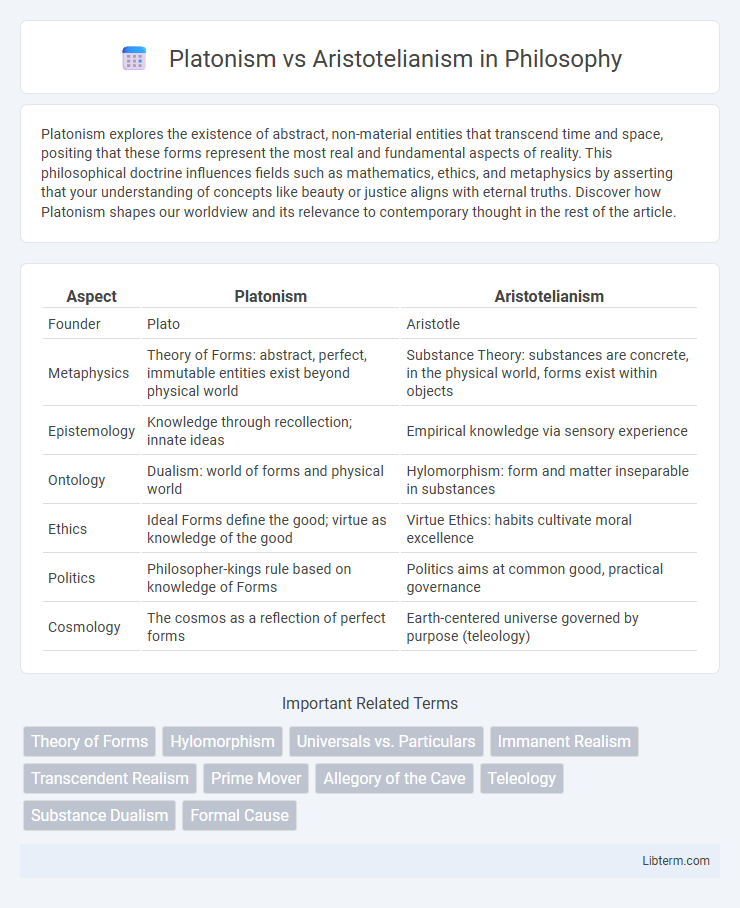Platonism explores the existence of abstract, non-material entities that transcend time and space, positing that these forms represent the most real and fundamental aspects of reality. This philosophical doctrine influences fields such as mathematics, ethics, and metaphysics by asserting that your understanding of concepts like beauty or justice aligns with eternal truths. Discover how Platonism shapes our worldview and its relevance to contemporary thought in the rest of the article.
Table of Comparison
| Aspect | Platonism | Aristotelianism |
|---|---|---|
| Founder | Plato | Aristotle |
| Metaphysics | Theory of Forms: abstract, perfect, immutable entities exist beyond physical world | Substance Theory: substances are concrete, in the physical world, forms exist within objects |
| Epistemology | Knowledge through recollection; innate ideas | Empirical knowledge via sensory experience |
| Ontology | Dualism: world of forms and physical world | Hylomorphism: form and matter inseparable in substances |
| Ethics | Ideal Forms define the good; virtue as knowledge of the good | Virtue Ethics: habits cultivate moral excellence |
| Politics | Philosopher-kings rule based on knowledge of Forms | Politics aims at common good, practical governance |
| Cosmology | The cosmos as a reflection of perfect forms | Earth-centered universe governed by purpose (teleology) |
Introduction to Platonism and Aristotelianism
Platonism centers on the existence of abstract, non-material Forms or Ideas as the true reality, asserting that these perfect archetypes underlie the physical world we perceive. Aristotelianism emphasizes empirical observation and categorization, positing that substances and their properties within the tangible world constitute reality, with form and matter inseparable in individual entities. Both philosophies address metaphysics and epistemology, but Platonism prioritizes transcendental universals while Aristotelianism focuses on the concrete particulars and natural sciences.
Historical Origins and Philosophical Context
Platonism originated in the 4th century BCE with Plato's teachings at the Academy in Athens, emphasizing the existence of abstract, eternal Forms or Ideas as the true reality behind the physical world. Aristotelianism, developed by Aristotle, Plato's student, focused on empirical observation and categorization, rejecting the existence of separate Forms and instead grounding essence within individual substances. The historical context reflects a shift from Plato's idealism toward Aristotle's naturalism, shaping Western philosophical traditions through contrasting metaphysical and epistemological frameworks.
Core Tenets of Platonism
Platonism centers on the existence of abstract, non-material Forms or Ideas that represent the true reality beyond the physical world, emphasizing innate knowledge and eternal truths. It asserts that sensory experiences are mere shadows of these perfect Forms, which can only be apprehended through reason and intellectual insight. This metaphysical framework underpins concepts of objective universals and a dualistic separation between body and soul essential to Platonic philosophy.
Fundamental Principles of Aristotelianism
Aristotelianism centers on the principle of substance, asserting that individual entities exist as combinations of form and matter, where form actualizes potential matter. Its metaphysics emphasizes empirical observation and categorizes reality through the Four Causes: material, formal, efficient, and final causes. This framework contrasts with Platonism's theory of abstract, immutable Forms existing independently of physical objects.
The Nature of Reality: Forms vs Substances
Platonism asserts that reality consists of eternal, unchanging Forms or Ideas that exist independently of the physical world, serving as perfect archetypes for all objects and concepts. Aristotelianism, in contrast, emphasizes substances as concrete, individual entities composed of both matter and form, where form does not exist separately but is intrinsic to each substance. This fundamental divergence shapes metaphysical perspectives, with Platonism prioritizing immutable universals and Aristotelianism focusing on the dynamic, empirical existence of particular things.
Epistemology: Knowledge and Understanding
Platonism posits that knowledge is innate and accessed through recollection of eternal, unchanging Forms, emphasizing a priori understanding beyond sensory experience. Aristotelianism, by contrast, grounds knowledge in empirical observation and inductive reasoning, asserting that understanding arises from sensory input and interaction with the physical world. These differing epistemologies highlight Platonism's reliance on idealism and Aristotelianism's foundation in empiricism and systematic classification.
Ethics: Moral Philosophy Compared
Platonism in ethics emphasizes the existence of objective, immutable Forms representing the highest moral values, with virtue achieved by aligning the soul to these ideal Forms. Aristotelianism, contrastingly, centers on practical virtue ethics, highlighting the development of moral character through habitual practice and the pursuit of the golden mean between extremes. Both philosophies profoundly influence contemporary moral theory by shaping views on the nature of virtue, ethical knowledge, and the purpose of human life.
Influence on Science and Metaphysics
Platonism significantly influenced metaphysics by emphasizing the existence of abstract, immutable Forms as the ultimate reality, shaping scientific inquiry toward seeking ideal, universal truths beyond physical phenomena. Aristotelianism grounded metaphysics and science in empirical observation and categorization, fostering a methodology based on direct study of nature and causal relationships, which laid the foundation for the scientific method. The contrasting views--Plato's focus on transcendental ideals versus Aristotle's emphasis on material causes--profoundly directed subsequent developments in philosophy, natural science, and epistemology.
Legacy in Western Thought
Platonism profoundly shaped Western metaphysics and epistemology by emphasizing ideal forms and the existence of abstract universals, influencing thinkers like Augustine and contemporary philosophers. Aristotelianism contributed foundational principles to logic, natural sciences, and ethics, forming the basis of Scholasticism and underpinning Renaissance and Enlightenment scientific inquiry. The enduring legacy of both lies in their complementary frameworks that continue to inform philosophical discourse, scientific methodologies, and educational curricula across the Western intellectual tradition.
Contemporary Relevance and Debates
Platonism and Aristotelianism continue to shape contemporary debates in metaphysics and epistemology, influencing perspectives on abstract objects and the nature of reality. Platonism's emphasis on the existence of universal forms underpins discussions in mathematics, logic, and moral realism, while Aristotelianism's focus on empirical observation and substance theory informs modern sciences and ethics. Recent scholarly discourse explores their applicability in areas like cognitive science, ontology, and the philosophy of mind, reflecting enduring tensions between idealism and empiricism.
Platonism Infographic

 libterm.com
libterm.com